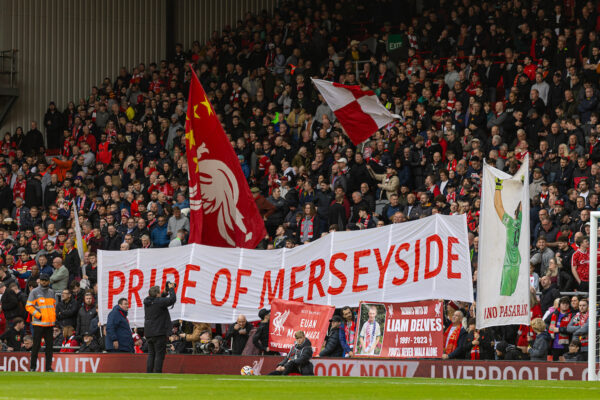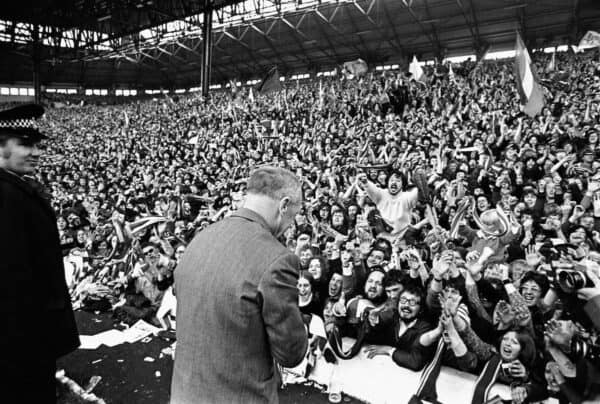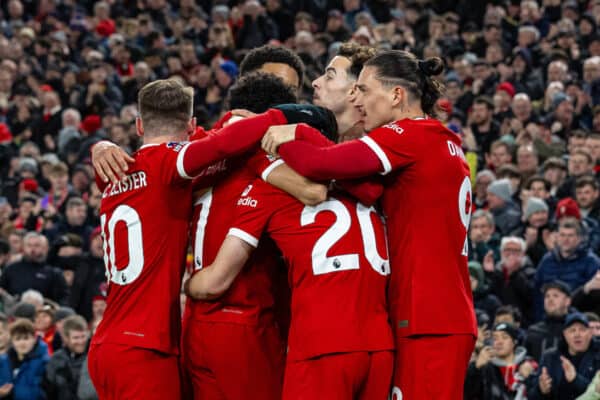The Kop songbook is one of Liverpool’s greatest assets in creating the famous Anfield atmosphere, but is enough praise being sung for our current players?
Mo Salah, Virgil van Dijk and Diogo Jota all have brilliant songs that are regularly heard at Anfield, but there exist very few other songs of any real substance for the current squad.
With this current crop of players quickly growing into heroes, it stands to reason that they should be being recognised by the crowd.
You’d expect this to be through songs, but that hasn’t happened yet, as This Is Anfield contributor and Kop season ticket-holder Gareth Roberts noted recently in an article for Love, Follow, Conquer.
Long gone are the days when every key player would be serenaded by having their names sang before kickoff. Among others, this ritual is no more.
So why aren’t there more new songs on the Kop?
First, a history lesson
Since the early 1960s, Liverpool fans have been known for their musical creativity, self-confidence and passionate, unerring displays of support.
This has often come in the form of songs for the players. It is hardly a unique phenomenon these days, but what is unlike most other clubs is Liverpool’s resistance to singing what others copy and repeat.
We want to be different; in some ways, we are different.
Recounting and explaining Liverpool’s complicated-but-fascinating disassociated feeling from England is for another day, but it does exist and has helped lead to a culture that is very much sceptical of ‘the new’.
This might seem contradictory to what the history books tell you, in that Liverpool is an opening, welcoming city.
It generally still is, but the distrust that now lies between the region and the rest of the country has its consequences.

Like in many places that have been left behind or have been castigated by the majority, Liverpool has developed a sense of ‘otherness’ that it is proud of.
This has brought with it a deep scepticism of the outside, or at least cynicism when looking inland, towards the Lancashire towns.
The term woolyback, usually just ‘wool’, is known to many supporters, even if they’re not from the city.
There are a couple of theories about the origins of the word, both with similar meanings – names to call people coming from surrounding areas to work on the docks.
These days, being a wool is as much about having a non-Scouse state of mind as it is physically living elsewhere.
Why is this relevant?

You might ask why am I giving you a lesson in Liverpool’s social history in an article about football songs.
Well, this culture of wanting to feel different has indirectly led to the lack of songs about our current players on the Kop, and also a decrease in red colours on show.
In my opinion, the supporter culture is changing – not necessarily for the worse, but some elements of what make Liverpool great are being forgotten.
You only have to look at the 1964 BBC Panorama footage of the Kop singing chart hits to see the difference in attitude to now.
For a start, supporters don’t get in the ground early – plenty of seats are only filled as the referee blows the first whistle.
But also, think about how alien it would be for fans now to start singing songs by Ed Sheeran or Taylor Swift before kickoff.
This isn’t a call to start belting out Love Story on the Kop before games, far from it.

However, you could argue that the idea of rejecting the mainstream has filtered through to the youth and keeps them from partaking in such activities, because they’re too wool or because they’re too mainstream.
This cynicism isn’t always a bad attitude to have in life but, when taken too far, it can become problematic – just have a look at Rickie Lambert’s Twitter timeline for proof of that.
You might think my argument about the city’s political outlook impacting on Dominic Szoboszlai not having a song is a bit of a stretch, but when you delve deeper the link is clear.
Merseyside’s culture is intrinsically linked to the nature of supporter behaviour at the match, whether that be the songs fans sing or the clothes they wear.
These days, ‘we all dream of a Montirex Kop’ would be a more accurate chant than a ‘red-and-white Kop’.
Some songs are better than others
It is very difficult to put into words why a new song, that a group of fans have come up with, may be deemed too wool.
Allez, Allez, Allez is a prime example of this. It became the soundtrack to Liverpool’s 2017/18 European run and is still regularly heard at Anfield.
However, some supporters feel it has been overdone and should only be used for European occasions.
Since the club began using the song in marketing campaigns, the words are now everywhere and other English clubs have quickly adopted it. They’ll conveniently forget that when they start singing ‘where’s your famous atmosphere?’, though.
Basically, the song became too popular, too wool, so its fashionableness decreased.
Supporters needed a new toy to play with. That came in the form of Roberto Firmino‘s song, then Diogo Jota‘s, but there is now a dearth of tunes that can be heard inside the ground.
There are plenty of mitigating factors in a new song’s success. It is why so many that you might see spread on the internet or in pubs around the ground don’t make it to Anfield.
They need to have simple, memorable words; they can’t seem cringy or wool; they can’t be too lengthy.
Most crucially, though, I’d argue that the player in question about whom the song is about, must be performing on the pitch.
Could that change soon?

Perhaps if Liverpool are lifting silverware in May we will look back at this piece and realise it was just a matter for time until new chapters were written into the Reds’ figurative hymnbook.
Things would still be different to the ’60s culture, when every player would have their name sung to some extent before kickoff, but it would at least be an improvement on the list of ditties we reel off currently.
Jota, Salah and Van Dijk need new partners on the musical red carpet. A new tune, written by Andy Hodgson, for Luis Diaz, is a good one.
It is to the tune of Bella Ciao, a 19th century Italian protest song, so you would think that’s the ‘non-wool’ box ticked.
Regularly being heard at Taggy’s Bar on a matchday, the ditty isn’t just an internet sensation. However, barring the back rows of the Kop, people just aren’t taking it into the ground.
This is where we arrive back at the atmosphere debate, that fun subject. A booming Anfield would be conducive to these new songs spreading.
Unfortunately, great atmospheres just aren’t happening consistently enough, and that is a problem that won’t be solved or explained in the conclusion paragraph of this piece.
It stands to reason, though, these atmospheres aren’t being allowed to happen because of ticketing issues and other problems caused by the club and modern football generally.


